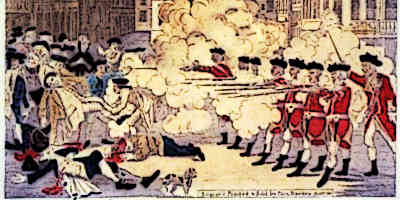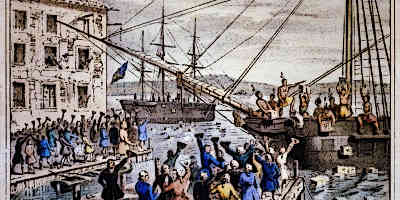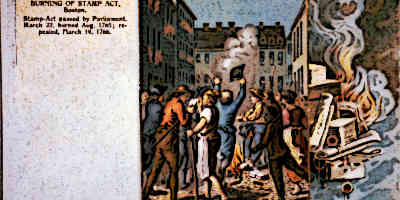Boston Massacre
A new tax on the colonies by Britain on the American colonies led to the Boston Massacre.
The Boston Tea Party
The Boston Tea Party was a famous event in American History that was caused by the British Governments Tea Act...
The Stamp Act 1765
The British wanted a permanent army in America, to pay for this they introduced a Stamp Tax in 1765 which...
What were the important events leading up to the American Revolution and what happened during and after the American Revolution had come to it’s conclusion?
Following is a brief overview of the notable events related to the American Revolution
Background
Starting as early as the 16th century, British settlers began attempts to establish settlements in North America. Some of these efforts were successful and resulted in settlements which became large colonies over time.
By the 18th century, Britain’s American colonies were large and prosperous. The British government now wanted to exert more control over these colonies and take a share of their wealth. This became a major cause of contention between the colonies and the British government.
The French and Indian War
The French and Indian War took place from 1754 to 1763. It was fought between the French and their Indian allies at one side, and Britain and the British colonies at the other side.
Britain won the war. However, it was a costly war and Britain incurred a lot of debt. Because of the war, a large number of British troops were also stationed in the colonies.
The British government now wanted to get enough money to pay its troops and it’s debts, to do that, the government decided to tax the colonies. This greatly angered the colonists and finally led to their revolt.
Taxation Without Representation
From 1763 onwards, British Parliament passed many laws to impose new taxes on the colonies. These included the Stamp Act; the Sugar Act and the Townshend Act.
The colonists strongly resisted these new taxation. Most colonists refused to pay the taxes and publicly called for a boycott of British goods.
Local colonial assemblies also passed resolutions against these laws. The colonists thought that it was unfair for a parliament sitting in Britain to impose taxes on the American colonies. They called this taxation without representation.
The Boston Massacre
In view of the protests of the colonists, British Parliament stationed thousands of British soldiers in Boston. One group of protesters clashed with a group of soldiers on March 5, 1770.
In the clash, 5 colonists died when the threatened British troops opened fire on the crowd. This incident became known as the Boston Massacre. It became an important turning point in the American Revolution.
Boston Tea Party
The British Parliament refused to heed the protests of the colonists. It continued to impose new taxes on the colonies. One of these was passed as part of the Tea Act in 1773. This act gave a monopoly on the tea imports to the East India Company.
This was very unfavorable for the colonists who now couldn’t trade tea on their own and also had to pay more taxes. In response, a group of protesting colonists boarded three British ships in December, 1773. They dumped a large consignment of tea stored on these ships. This incident became famously known as the Boston Tea Party.
Loyalists vs Patriots
The loyalists were the colonists who wanted the American Colonies to remain a part of the British Empire. The Patriots were the colonists who wanted independence from the Empire.
Initially, a large number of colonists were loyalists and simply wanted more rights. But when British Parliament refused to heed their demands, more and more colonists became Patriots.
The American Revolutionary War
Although the revolution had started as early as 1765, the actual war between Britain and the colonies started in 1775. The first shots were fired at the Battles of Lexington and Concord.
These were fought near Boston. Although neither side gained a clear victory, this marked the beginning of the war. The war continued all the way until the end of the Revolution in 1783. It culminated with a decisive British defeat, the independence of the Thirteen Colonies and the birth of the United States.
First and Second Continental Congress
The First Continental Congress met in 1774. It comprised of a group of representatives from all the Thirteen Colonies. It was a sort of a parliament for the colonies at a time when the colonies were resisting British government. The First Continental Congress protested British taxes and petitioned the British King.
The Second Continental Congress met in 1775 after the war had begun. It first asked King George II to heed the demands of the colonists and bring an end to the war. When that failed, the Congress acted as the De-facto government of the colonies during the war. It recruited troops, directed the strategy and took diplomatic decisions.
Declaration of Independence
The Declaration of Independence was a significant event in the American Revolution. It was adopted on July 2, 1776 by the Second Continental Congress. This declaration stated that the Thirteen Colonies now considered themselves independent of the British Empire. The declaration marked the
Birth of the United States.
The End of Revolutionary War
At the start of the Revolutionary War, the British forces gained important victories. However, the colonists gradually built militias and armies. Soon they were a match for the British armies.
At the same time, France also allied itself with the colonies. This led to important victories for the Continental Army under the leadership of George Washington.
In 1781, one of the two main British armies fighting in the war was surrounded and forced to surrender. This ultimately resulted in the defeat of Britain and the signing of the Treaty of Paris.
The Treaty of Paris
By 1783, the American colonies had won the Revolutionary War. Britain and United States signed the treaty of Paris. In this treaty, British formally accepted the independence of its former American colonies.
The colony also established important trade ties between Britain and US. These ties would greatly help the newly-born United States in its early years. With the signing of the Treaty of Paris, the war officially came to an end.


